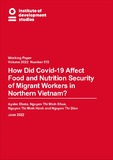| dc.contributor.author | Ebata, Ayako | |
| dc.contributor.author | Nguyen, Khue Minh | |
| dc.contributor.author | Nguyen, Thi Minh Hanh | |
| dc.contributor.author | Thi Dien, Nguyen | |
| dc.coverage.spatial | Vietnam | en |
| dc.date.accessioned | 2022-06-21T09:30:15Z | |
| dc.date.available | 2022-06-21T09:30:15Z | |
| dc.date.issued | 2022-06-21 | |
| dc.identifier.citation | Ebata, A.; Nguyen, T.M.K; Nguyen, T.M.H. and Nguyen, T.D. (2022) How Did Covid-19 Affect Food and Nutrition Security of Migrant Workers in Northern Vietnam?, IDS Working Paper 572, Brighton: Institute of Development Studies, DOI: 10.19088/IDS.2022.043 | en |
| dc.identifier.isbn | 978-1-80470-003-7 | |
| dc.identifier.issn | 2040-0209 | |
| dc.identifier.uri | https://opendocs.ids.ac.uk/opendocs/handle/20.500.12413/17484 | |
| dc.description.abstract | This study explored how measures to curtail the spread of the coronavirus (Covid-19) in Vietnam affected the livelihoods and food and nutrition security of internal migrant workers. While Vietnam has made impressive progress towards food security in the past decades, marginalised groups of people such as ethnic minorities and migrants continue to face significant challenges. The project team investigated how the pandemic affected the precarity of these groups’ income-generating opportunities and how the level of income generated affected the quality, as well as the quantity, of food consumed by migrant workers in Hanoi, the capital, and the Bac Ninh province, which hosts large industrial zones. Our research shows that income for migrant workers significantly reduced as a result of Covid-19-related lockdown measures. Almost half of the respondents were considered to be either moderately or severely food insecure. Financial support provided by the government hardly reached migrant workers because of the registration system required to receive unemployment benefits. To reduce the vulnerability of migrant workers, we conclude that: short-term crisis responses need to focus on providing nutritious, healthy, and ample food to migrant workers; policies that impose minimum standards of living need to be effectively enforced; the coverage of existing social safety nets by the government needs to be expanded; and a radical reform of labour law is needed to improve labour rights for migrant workers. | en |
| dc.description.sponsorship | Foreign, Commonwealth & Development Office | en |
| dc.language.iso | en | en |
| dc.publisher | Institute of Development Studies | en |
| dc.relation.ispartofseries | IDS Working Paper;572 | |
| dc.rights | This paper was funded by the UK government’s Foreign, Commonwealth & Development Office (FCDO) through the Covid Collective. It is licensed for non-commercial purposes only. Except where otherwise stated, it is licensed for non-commercial purposes under the terms of the Open Government Licence v3.0, which permits use, copying, publication, distribution and adaptation, provided the original authors and source are credited and the work is not used for commercial purposes. | en |
| dc.rights.uri | https://www.nationalarchives.gov.uk/doc/open-government-licence/version/3/ | en |
| dc.subject | Migration | en |
| dc.subject | Nutrition | en |
| dc.subject | Politics and Power | en |
| dc.subject | Work and Labour | en |
| dc.title | How Did Covid-19 Affect Food and Nutrition Security of Migrant Workers in Northern Vietnam? | en |
| dc.type | IDS Working Paper | en |
| dc.rights.holder | © Institute of Development Studies 2022. © Crown Copyright 2022. | en |
| dc.identifier.team | Knowledge Technology and Society | en |
| dc.identifier.doi | 10.19088/IDS.2022.043 | |
| dcterms.dateAccepted | 2022-06-21 | |
| rioxxterms.funder | Default funder | en |
| rioxxterms.identifier.project | Default project | en |
| rioxxterms.version | VoR | en |
| rioxxterms.versionofrecord | 10.19088/IDS.2022.043 | en |
| rioxxterms.funder.project | 9ce4e4dc-26e9-4d78-96e9-15e4dcac0642 | en |

